

Home is Where the Block Is.
Classes and professors that ignite your curiosity. A campus at the foot of the majestic Rockies. Intelligent (and fun!) peers who challenge and support you. A place you can call home.
For 150 years, Colorado College has provided a robust learning and living experience, 50 years delivering it with our intensive, innovative Block Plan, where you take only one class at a time. (No, really, just one.)
On the Block Plan, time works differently. So do we. We climb higher, we problem-solve faster, we look deeper. And so can you.

At CC, we don’t settle. We’re committed to antiracism. We’ve achieved carbon neutrality. We push boundaries and surpass expectations. On the block, we think outside the box.
From scientists and politicians to artists and technology directors and anything and everything else, the CC education prepares you for any path you choose. A singular academic focus provides flexibility in your schedule, for academic pursuits and passions outside the classroom.
Our community is made stronger with more doers, thinkers, and dreamers. Like YOU. We can’t wait for you to join us!

Can you learn, say, biology in just 3.5 weeks? Yes! With the one-class-at-a-time approach of the Block Plan, you’ll immerse yourself so profoundly into the material — without any distractions from other subjects — that you’ll walk away with a deeper understanding.
It all started 50 years ago with a group of innovators, including faculty and students, hoping to influence the way we teach and learn during a time of educational experimentation. Those innovators asked themselves, how can we do what we’re doing better?

Learn Intentionally, One Class at a Time
Always.
The Block Plan
Not only better, but different. We think differently, we learn differently, and with the Block Plan, time unfolds a bit differently, too. One three-hour class (on average) a day, five days a week, for three-and-a-half weeks. One “block” is equal to one class on a typical semester plan.
CC took a risk by implementing this unconventional learning format, just as we encourage you to take risks every day in your educational adventure. By the time you graduate, you will be equipped with the tangible, real-world skills to take on any challenge.

Gray Cullen ’22
he / him / his English / Economics Hudson, NYI love the location, the mountains, the daily views we have here! Colorado College has a very different personality from my hometown; it’s pretty laid back, but the Block Plan allowed me to explore so many opportunities, and to schedule things beyond class.
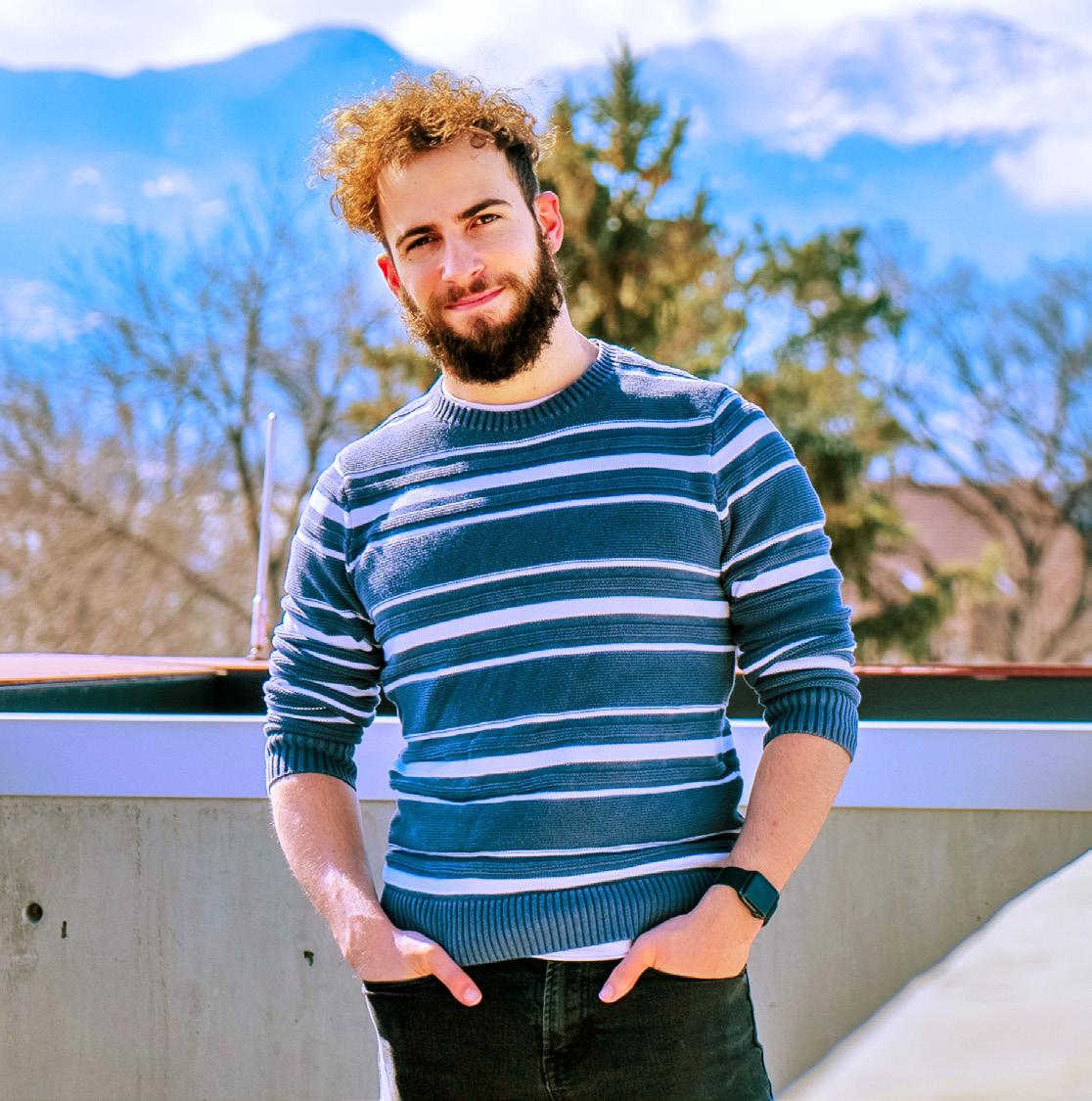

I’m able to really embrace multiple sides of my academics here at CC. I love being able to study the work of one person, like filmmaker Alfred Hitchcock, in such depth. Because I’m on the swimming team, my time is split; but I have 50 friends by default! With class in the morning and practice in the afternoon, there’s a mix of fun and focus.


The Versatility of the Block Plan
“The Block Plan allows you to make plans, and then adjust them on the fly. I was able to add a second major in my junior year.”Escape the typical science classroom and collect riverbed samples from across
thestate for a summer research project.

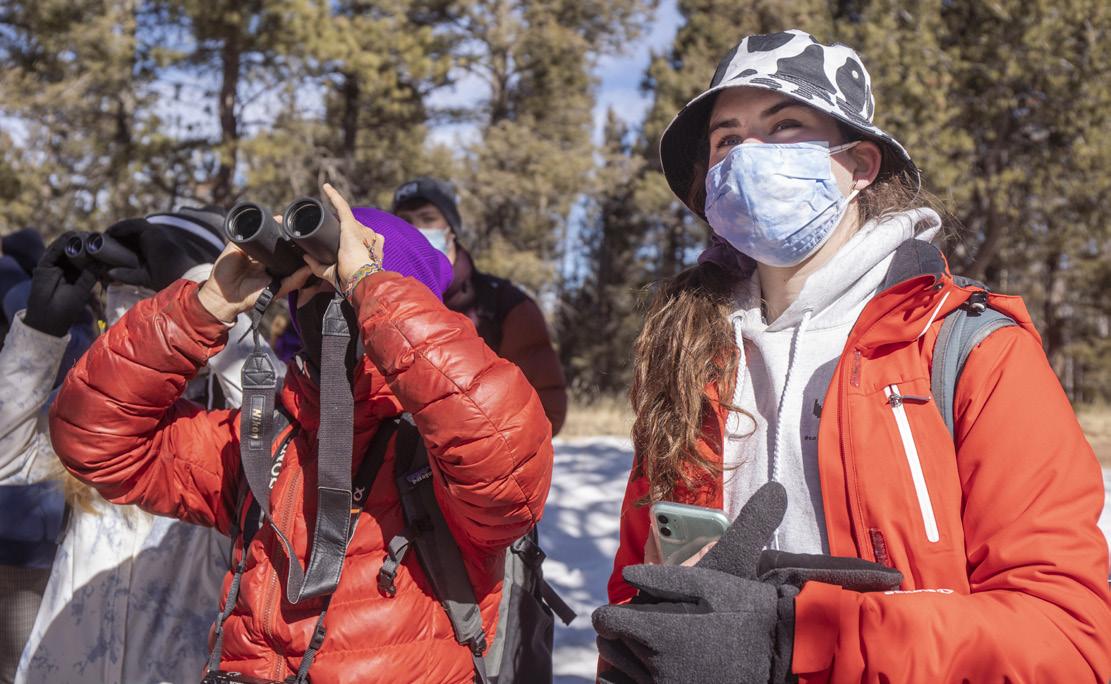


 Head to the Denver Art Museum to study the impact of architecture on people and spaces.
Study complex math and computer algorithms with your classmates at the CC Gilmore Stabler Cabin.
Observe the ecology of trees and wildlife in their natural state in one of the nearby national forests.
Research and discuss topics from books and participate in Socratic seminars to share your perspective.
Head to the Denver Art Museum to study the impact of architecture on people and spaces.
Study complex math and computer algorithms with your classmates at the CC Gilmore Stabler Cabin.
Observe the ecology of trees and wildlife in their natural state in one of the nearby national forests.
Research and discuss topics from books and participate in Socratic seminars to share your perspective.
Collaborative Classrooms


Ankita Sharma ’21

she / her / hers
Anthropology / Dance Fremont, CA
With anthropology and dance, they are two separate disciplines but there’s a lot of overlap. There’s discourse about the body, culture, expression — all these things that span across across the focuses.

I’m the director of Dance Workshop. It’s a huge event — 15% of the student body participates — so there’s a real sense of community on campus around that.

The outdoor access we have here is amazing, and I’ve been really impressed by CC’s approach to outdoor accessibility and creating equity in those spaces.

“The unique learning opportunity that the Block Plan provides put CC on my radar. When I visited campus, there was a real sense of warmth and collaborative community. That’s what hooked me.”
Teaching On The Block Plan
Olivia Hatton she / her / hers Associate Professor of Molecular Biology

What stands out about teaching at CC?
The freedom to be creative in the classroom. Creativity is somewhat necessary with the format of the Block Plan.
While I’m sure I could lecture for three hours, I don’t think anyone — myself included — really wants that!
One of the things I appreciate most about the students at CC is that, in general, they’re game for anything you try in the classroom; there’s an adventurous spirit to learning.
As a professor, I appreciate the ample opportunities for funding and the workshop opportunities for students through the Student Collaborative Research program.
What does a CC education provide students in terms of benefits to their lives and careers, beyond their four years at CC?
When I talk to our molecular biology alumni, one of the themes they note is that, compared to their fellow graduate students, medical students, or colleagues, they’ve had more experience reading primary literature in the field and practicing both their writing and oral communication skills. There is also a confidence in their ability to try new things, and they can accomplish a lot in three weeks!
Favorite moments at CC?
In Summer 2019, I had five student researchers working in my lab. Throughout the summer, we went on a number of outings, including lunch at the Yellow Mountain Tea House, an afternoon at the Cheyenne Mountain Zoo, an evening watching “Toy Story 4.” We celebrated their hard work in the lab, and when the paper they co-authored with me was published in Frontiers in Microbiology



“Creativity is somewhat necessary with the Block Plan. One of the things I appreciate most about the students at CC is they’re game for anything you try in the classroom.”
Connecting to Students
Manya Whitaker she / her / hers Associate Professor of Education Executive Vice President and Chief of Staff

What stands out about teaching at CC?
At CC, everyone is excited to try new pedagogies, team teach, and develop new courses. In many colleges and universities, the faculty tolerate teaching, preferring to spend their time on research. Here, it is clearly our top priority as a teaching college, but we actually enjoy it.
What does a CC education give students in terms of benefits to their lives and careers, beyond their four years at CC?
I always describe our students as open-hearted. These are students who truly want to know and do better. Learning is not merely an intellectual exercise for them, but a personal one. They are committed to becoming not only smarter people, but better people. Spending at least three hours a day together for 18 days means there is ample opportunity for students to quiz us (lol) about ourselves that is often lacking in traditional academic models. CC is about learning how to learn. Our emphasis on the process instead of the product is applicable to any field for the rest of students’ lives.
Favorite moments at CC?


One that stands out in my memory is during First-Year Program when my students had one night to prepare for a debate the next day. One of the groups showed up in matching outfits and had choreographed some dance moves to accompany their debate points. I laughed so hard I cried. That’s why I look forward to going to work. The students bring me joy.

“I always describe our students as open-hearted. Learning is not merely an intellectual exercise for them, but a personal one. They are committed to becoming not only smarter people, but better people.”
John Capers ’21
he / him / his Political Science / German Chicago, ILOne thing that really excites me about CC is having a lot of intimacy with the people and the courses, and how you grow close to classmates and professors. The Block Plan really helps develop strong relationships with people, and it creates a space that feels authentic.
The Berlin course with Professor Heidi Lewis, Intersectionality and Hidden Narratives, really was amazing.
I also took the Luneburg Program, a semester-long program abroad in Germany. You live with a host family, which I just loved, and you take a mix of classes at the local university and then Block Plan classes with CC students.
Immerse Yourself
A professor and student explore micrometeorology in the Great Sand Dunes National Park.

Field Study & Study Abroad


Why stay within four walls when you can take a course that treks through the American Southwest or the world’s greatest artworks in New York City’s MoMA? Or pursue academic explorations in Morocco, India, Japan, or Greece? On the Block Plan, classes have the flexibility and adaptability to take you off campus and engage in intercultural, international, and experiential learning in the field and worldwide.
Field study and study abroad are integral parts of life here at Colorado College. Utilizing both the Block Plan and our Rocky Mountain region (or the globe for that matter), our innovative and immersive academic experiences allow you to learn in ways that just aren’t possible elsewhere. They are both great ways — sometimes, once-in-a-lifetime opportunities — to get off campus for a few days or a few blocks and embed yourself in the environment you’re studying.
“Being abroad and outside of your norm really helps you find community.”
70% of Colorado College students opt to learn off campus at least once during their undergraduate years. Why? Off-campus study is critical to the CC philosophy. It’ll challenge your perspectives, offer unique insight, help you develop an understanding of topics from varied cultural outlooks … it could possibly change the entire trajectory of your intellectual pursuits Whether it’s out of state, leaving the country, or right here at home — at CC you’ll find that anything is possible.
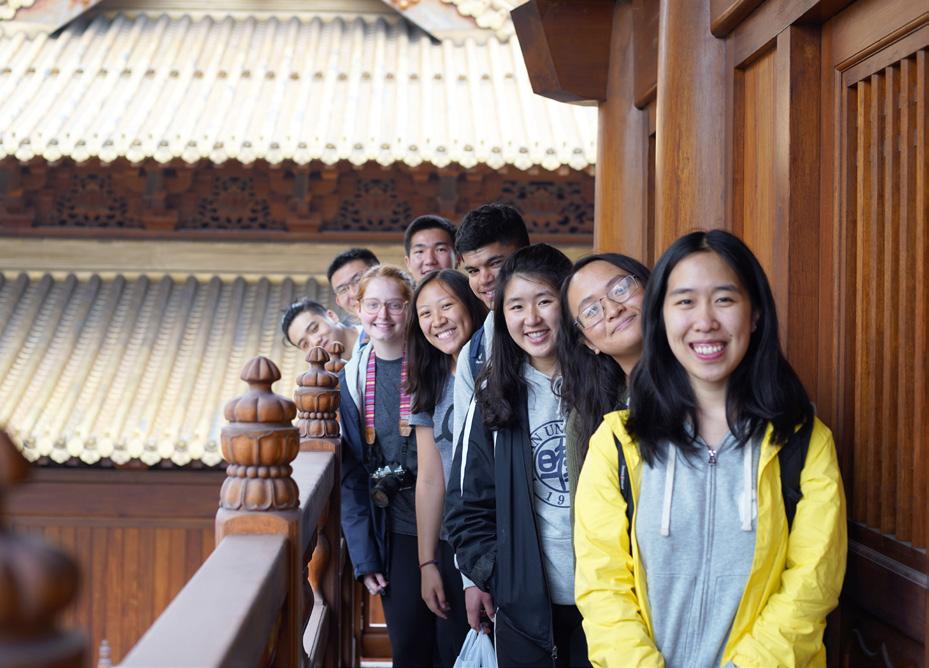


 (Above) Journalism students get hands-on experience at news firms in Washington, D.C.
(Left) Students explore cultural sites near Shanghai, China, during the semester-away study abroad program.
(Above) A student provides science lessons to fifth graders in La Veta, CO.
(Below) Students take a break from their study abroad class in Greece where they follow Ulysses’ journey from “ The Odyssey.”
(Above) Journalism students get hands-on experience at news firms in Washington, D.C.
(Left) Students explore cultural sites near Shanghai, China, during the semester-away study abroad program.
(Above) A student provides science lessons to fifth graders in La Veta, CO.
(Below) Students take a break from their study abroad class in Greece where they follow Ulysses’ journey from “ The Odyssey.”
Tackling Multiple Passions
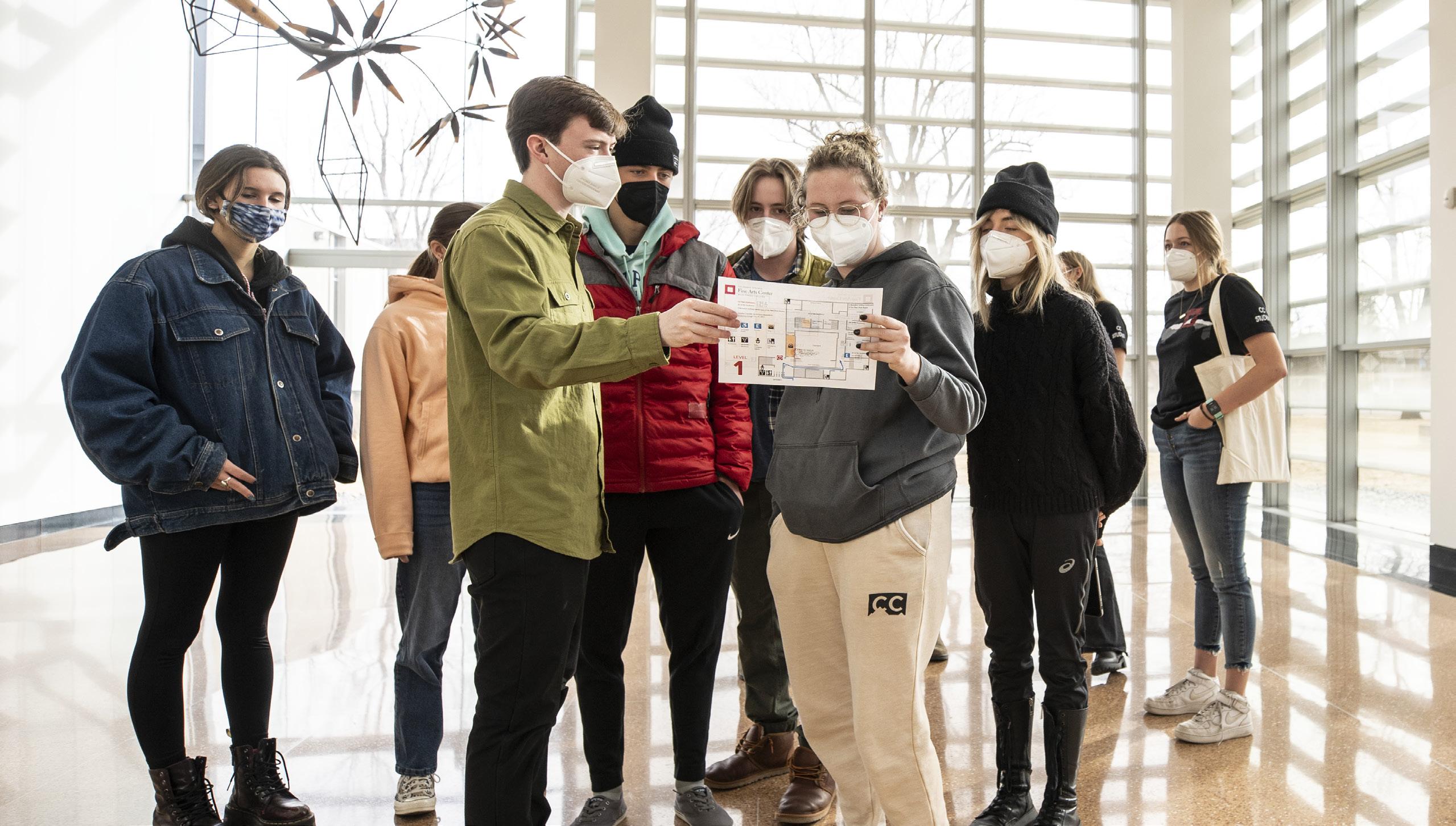



 Get creative by making your own posters and other printed projects with manual letterpresses at The Press at CC.
Dance Workshop is one of the biggest, most thrilling events of the academic year.
Participate in an internship with Colorado Public Radio at KRCC, CC’s professional NPR-member radio station.
Bluegrass culture has deep roots at CC. Pick up a mandolin and join a jam session with fellow musicians.
Established over 100 years ago as the Broadmoor Art Academy, the Colorado Springs Fine Arts Center at Colorado College is a world-class institution containing an art museum, a performing arts theatre company, and an arts school. The center acts as the bridge between art and academics. Students can catch major exhibitions and theatre productions, use the center’s massive collection of Southwest art for coursework and research, or participate in internships and work-study to learn and practice museum professions.
Get creative by making your own posters and other printed projects with manual letterpresses at The Press at CC.
Dance Workshop is one of the biggest, most thrilling events of the academic year.
Participate in an internship with Colorado Public Radio at KRCC, CC’s professional NPR-member radio station.
Bluegrass culture has deep roots at CC. Pick up a mandolin and join a jam session with fellow musicians.
Established over 100 years ago as the Broadmoor Art Academy, the Colorado Springs Fine Arts Center at Colorado College is a world-class institution containing an art museum, a performing arts theatre company, and an arts school. The center acts as the bridge between art and academics. Students can catch major exhibitions and theatre productions, use the center’s massive collection of Southwest art for coursework and research, or participate in internships and work-study to learn and practice museum professions.
John Schuler ’21


he / him / his Physics / Education Chicago, IL
I knew I wanted to play soccer, but also to go somewhere engaging with challenging academics. As I grew beyond athletics into the larger CC community, I started to try new things like Dance Workshop. I met SO many people through it, and I’ve done it every semester since my second year.

Classes here are challenging but really fun, and my physics major is a great example of that. You spend nine to 10 hours a day in the lab, with five people in a class, all working on circuitry and building. It’s immersive, but so great.

“Being a student-athlete at CC is unique; you have to jump right in as part of a team and as a student at the same time — there’s a real intensity to things here. That’s the nature of life here; you jump in, always.”Opened in Fall 2021, Ed Robson Arena is the new home of CC Tiger hockey and for the first time hockey competitions are now played on campus. Next door to the 3,400-seat arena is the new Yalich Student Services Center which includes a classroom, bookstore, and counseling and wellness resources.
Creativity & Innovation at CC
Creativity and Innovation are in our DNA. We take our institution’s creative energy and insert it into daily learning, and life, on campus. We don’t stop with the how; we explore the why of complex and dire issues facing your generation and our globe.


Through interdisciplinary courses and co-curricular programs, you’ll amplify your education and discover how to approach challenges with thoughtful problem-solving. Go beyond entrepreneurial pitches and tech apps — we teach and apply the elements of creativity, reflection, and risk so that you are able to assess, experiment, and innovate on ventures more clearly and confidently.
We embrace failure so that your next solutions are better and quicker. Building upon the results and rigors of a Block Plan education, we fortify your skills and empower you with the confidence to make change in your communities and the world.
An incubator of ideas
State of the Rockies Project
Collaborative research and action

Centered at Colorado College, the State of the Rockies Project provides students the opportunity to embark on interdisciplinary investigations into how human activity can be balanced with environmental sustainability in the Rocky Mountain West.


Collaborate with faculty on critical socio-environmental research in your own backyard. Expand your understanding and sense of activism around issues of raging wildfires, fracking and burning fossil fuels, light pollution, threats to wildlife, water rights, and the future of our majestic national parks and forests.
Our wondrous region is not only where you will live and play, but how you will learn in the actual environment as an extension of the classroom. Through the State of the Rockies, field study, and research, you will be empowered to become a steward of the environment wherever you go.
 The campus comes alive as students begin to leave class, normally around noon. The Charles L. Tutt Library is not your average college library. It’s the academic hub of campus and houses research centers, a GIS lab, a technology bar, a café, three outdoor terraces to soak up the views and sun, and of course, more than 425,000 volumes of books.
The campus comes alive as students begin to leave class, normally around noon. The Charles L. Tutt Library is not your average college library. It’s the academic hub of campus and houses research centers, a GIS lab, a technology bar, a café, three outdoor terraces to soak up the views and sun, and of course, more than 425,000 volumes of books.

Things to Do & Places to Go Around the Springs


Manitou Springs: Enjoy an afternoon of shopping, dining, and people-watching in the quirky little town of Manitou Springs. www.manitousprings.org

The Incline: Just less than a mile in length, this famous trail is 2,768 steps that gain 2,000 feet in elevation and is not for beginner hikers. Advance online reservations are required. www.manitouincline.net

Garden of the Gods Park: This registered National Natural Landmark is a beautiful scenic experience. Bring a picnic, a bike, or your hiking shoes and spend the day exploring.


www.gardenofthegods.com
United States Air Force Academy: Visitors may access several overlooks across the Academy, the Cadet Chapel, the Honor Court, Arnold Hall, the Cadet Field House, the Falcon Athletic Center, Falcon Stadium, and the Visitor Center. www.usafa.edu/visitors

Red Rock Canyon Open Space: A city park located between Colorado Springs and Manitou Springs, the open space has 11 miles of trails and great views of Garden of the Gods.
www.redrockcanyonopenspace.org
U.S. Olympic and Paralympic Museum: The 60,000-square-foot space opened in July 2020 and includes 12 galleries and several interactive exhibits. www.usopm.org

Colorado Springs Fine Arts Center at Colorado College: Built on the foundation of the prestigious Broadmoor Art Academy, the FAC carries the legacy of Colorado’s arts and cultural heritage. fac.coloradocollege.edu
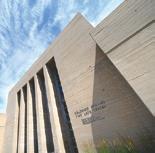
North Cheyenne Cañon Park: This 147acre regional park includes 56 miles of hiking and biking trails, boulders for climbing, and two visitor centers. Make sure to check out Helen Hunt Falls, a 35-foot waterfall. www.cheyennecanon.org
Pikes Peak Highway: The 19-mile highway is open year-round (weather permitting), and provides stellar views of both Colorado Springs and Pike National Forest. For an extra treat, visit the donut shop at the summit! www.coloradosprings.gov/pikes-peakamericas-mountain

Cheyenne Mountain Zoo: Visit America’s only mountainside zoo, located 6,800 feet above sea level. Feed the giraffes, visit 119 species, and ride the Sky Ride.

www.cmzoo.org
Downtown Colorado Springs: Take a stroll down Tejon Street and explore the downtown culture of Colorado Springs. Enjoy fine restaurants, cafés, shops, and parks. www.downtowncs.com

The Broadmoor: You don’t have to be a guest at this five-star resort to enjoy its fine dining and scenic walkways. Enjoy dinner in one of its many restaurants before taking a walk around the beautiful Broadmoor Lake. www.broadmoor.com

The City at the Foot of “Tava”
From every vantage point on campus, it’s hard to miss the stupendous mountain to the west. As you stroll across campus, relax on the quad, or watch soccer games, you’ll do it all under the gaze of the 14,115-foot (4,302-m) Pikes Peak, what the Indigenous and native community of the region call “Tava`Kaavi’’ or “Sun Mountain.” CC sits on the unceded territory of the Nuùchi (Ute) People who once dwelled, hunted and gathered, and performed ceremonial traditions on the land. Their descendants, and descendants of other Indigenous tribes, continue to honor, utilize, and live in the region today.
Colorado Springs – the state’s second-largest city – sits at 6,035 feet (1,839 m) and is the gateway to urban centers on the Front Range and to the foothills, peaks, and valleys of the Rocky Mountains. With more than 300 days of sunshine, you get the best of both worlds: a vibrant natural environment and a breathtaking, modern city with endless opportunities to connect to the outdoors, our neighbors, and yourself.
Downtown Colorado Springs is just a 15-minute walk from the CC campus. Acacia Park, Poor Richard’s Bookstore, and Josh & John’s Ice Cream are just a few places where our students love to hang out. You can also pursue internships and volunteer opportunities with downtown businesses. And when you’re up for the challenge, there are more than 400 miles of hiking and biking trails in the area, and the state capital of Denver is only 65 miles away. When we venture beyond our campus boundaries, we feel more connected to our community and make a bigger impact on the place we call home

CC is the only institution of its kind in its time zone, giving you unparalleled access to the rich and unique environmental terrain, history, culture, politics, and industry of both the Rocky Mountains and the Southwest. The region is where we learn, live, and play! Most academic departments have field study components.

Your CC journey starts with a “Priddy Experience” trip as part of New Student Orientation, when you and your Priddy team spend three days volunteering for a service project in the Southwest region and exploring the local and cultural surroundings. After each block, you get four and a half days to refresh and recharge. The expansive natural surroundings offer the perfect opportunity to leave campus, have fun, and relax your mind. Or, better yet, find a cozy nook on campus to simply admire the surrounding beauty. We’re down with downtime, too

CC’s Outdoor Education Program allows you to develop leadership skills, a sense of stewardship, and self-discovery through experiential opportunities in the outdoors. You have unfettered access to the Gear House, which supplies every type of outdoor equipment you can imagine: backpacks, sleeping bags, tents, ski equipment, kayaks, bikes, and more for your adventures. If you want to join a trip or skills clinic, Outdoor Ed pledges inclusivity and offers financial aid.





We’re Black & Gold... and Green
In 2009, CC launched an ambitious pursuit: campus-wide carbon neutrality by 2020. We crushed that goal, becoming only the eighth institution in North America and the first in the Rocky Mountain region to do it.

We did this while achieving the greatest emissions reductions and buying the fewest offsets of any other U.S. campus. That means we did the hard work up front, like efficiency upgrades, building renovations, campus engagement, and on-site renewable energy. We reduced our carbon footprint even as our physical footprint expanded by 10%.


Putting in the Work to Stay Carbon Neutral


And every new major building project must meet a sustainability and carbon-free benchmark. At CC, clean energy is a committed investment, not only in expressed values but in the resources to back it up, too.




Reaching our goal took a community-wide effort involving determined leadership, trailblazing faculty and staff, and earnest students. In fact, it’s often our students who lead the charge for sustainable action. With the help of our newly formed Climate Change Task Force, we’ll apply CC tenacity and innovation to make more strides toward a green future


 A sample of achievements made toward carbon neutrality, 2009-2020.
Colorado College oversees the health and maintenance of
A sample of achievements made toward carbon neutrality, 2009-2020.
Colorado College oversees the health and maintenance of
Building a Place of Belonging
Breaking down entrenched, systemic barriers is at the heart of CC’s antiracism, diversity, equity, and inclusion efforts. Every single person who walks through our halls must feel like they belong, can contribute, and reach their fullest potential without harm to who they are, how they see themselves, and the dreams they want to achieve
Throughout CC history, Black, Indigenous, People of Color (BIPOC), and other people from marginalized groups have been at the forefront of fighting discrimination. In 2019, Colorado College publicly launched its Antiracism Implementation Plan to support the entire college community in disrupting cycles of oppression. We were one of the first academic institutions to make such a commitment. The plan is ambitious and essential; it provides a roadmap for diversity, equity, inclusion, and antiracism efforts among students, faculty, staff, and college leaders. It calls for us to remove or change policies and procedures that impact our ability, for example, to increase our compositional diversity, not only among students but also who they see teaching, leading, and working; to ensure students remain engaged and lead parts of the plan; and to offer courses that fully reflect global knowledge, not just the Western canon.


 Galaty
they / them / theirs Mathematical Economics Denver, CO
Galaty
they / them / theirs Mathematical Economics Denver, CO
’21
Teaching and learning will be more effective when we’re more diverse and inclusive. By actively examining and opposing how racism exists and persists at CC and in society, you will gain a better sense of how to promote fairness and equity during and after college and carry the work forward to whatever life and career goals you pursue. Ultimately, taking an antiracist approach to learning and living benefits everyone.
CC’s antiracism commitment is a living, growing, and evolving plan. We are just beginning, and we have a long way to go. That’s why we need you — your ideas, your energy, and your advocacy for a more just world. The only way forward is together.
I love having a close friend network at CC. The board game club has persisted (at times, virtually) through the pandemic, and the rugby team has continued to be awesome. I’m really close to my supervisors and advisers here. That personal connection goes beyond academic life – it’s incredibly helpful, vital in fact.


The pattern of your day on the Block Plan is really important. From class in the morning, you have the accessibility of pursuing your interests in the afternoon. Lunchtime is always shared with friends, every day. You all come from different places, academically, and then debrief together over food. It’s a small marker in the day, but it’s really important.
 Bridget
Bridget
“People here gravitate toward passion, and everyone is different. I really look forward to conversations with people who are curious about something different than me, regardless of what that is.”Daya Stanley ’22 she / her / hers Feminist & Gender Studies Chicago, IL

People can collaborate here, easily. It’s about building consistent connections and conversations. As chair of Black Women at CC, I’ve learned a lot about things I wasn’t initially prepared to handle. How do you plan community around affinity groups? I had to find the language of that work, those skills.
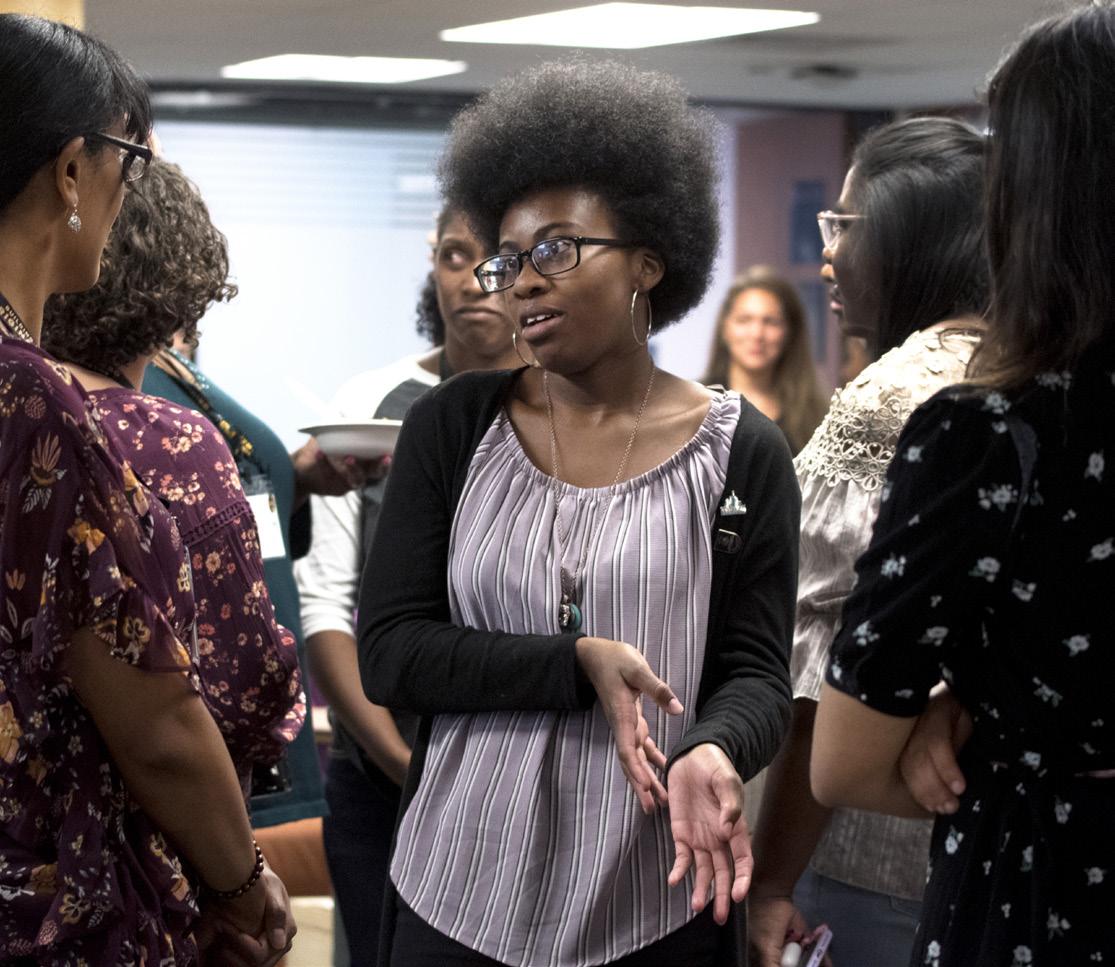
I’ve met so many Black women in Colorado Springs outside of CC and brought them to campus for events, including the Women of Color painting night as well as the Black Women’s Formal.
Join the Legacy of Trailblazers
You’re unique. A nonconformist. A trailblazer. We get that. So are we. CC attracts a vibrant community of those who prefer the road less traveled. You want to make a difference in the world, and so does everyone around you at Colorado College. Here, we want you. Original, brilliant you. What we’re trying to say is this — bring your whole, true self here. We strive to welcome everyone.

“The community here at CC is really interesting; there are so many differences among us and that’s okay!”A student’s creation of a large, playful, action-based painting exercise in which students used their own bodies as paint brushes.
You have a place at CC — and when we say you, we mean however you identify yourself and how you want to be heard, seen, and known. You can choose from various residence halls, apartments, cottages, and themed housing, such as language houses, multicultural housing, quiet and substance-free options, and dynamic living and learning communities established by students like you. Wherever you live, you’ll settle into a college routine and discover a world of unique individuals coming together to build a community.

Maybe it’ll be your roommate, the person you sit next to in your first class, or someone at an open table at lunch. You never know when you’ve found your college best friend, a forever friend, someone who’ll make you laugh, clap your back when finals are done, or be your go-to person to watch hockey games. But one thing’s certain: they’re at CC, and they’re ready to meet you.


 Students celebrate Holi, an ancient Hindu festival during which people throw colors at each other and celebrate with music and dancing.
Students celebrate Holi, an ancient Hindu festival during which people throw colors at each other and celebrate with music and dancing.
MARTHA WOLDAY ’14


Economics major
Where do you live? San Francisco, CA
What is your title/company? Senior program manager at Twitter Are there any particular skillsets you learned at CC that are useful to you now? The liberal arts curriculum taught me how to think critically and problem solve, which has been foundational to every role I’ve had. Additionally, operating on the Block Plan conditioned me to work efficiently and effectively for a short duration of time, which mirrors the project/deliverable-based work expected of you in the workforce.
Did you study abroad? I studied abroad in Accra, Ghana. The opportunity to learn from professors there about global topics and history pertaining to Africa was unmatched.
What advice do you have for future Tigers? Reach out to alumni early in your time at CC. The opportunity to learn from their experiences regarding both their academic and professional careers will enable you to refine and iterate on your own career and, more importantly, life roadmap.

Success After CC
ALEC SHEFFIELD ’18

Neuroscience major, minors in physics and biochemistry
Where do you live? New Haven, CT
What is your title/company? Research engineer and neuroscience Ph.D. student at Yale University How is your major related to your current work? I work as a research technician in a neuroscience lab, studying the circuit mechanisms of innate social behaviors in mice.


How did your experience at CC help you find your first position after graduation? I had been working as a technician at MIT since graduation. The CC Career Center helped me in writing my resume, and I only realized how substantial that was now that I’m witnessing the hiring process for my replacement. Many undergraduates have vague or poorly worded resumes that are immediately thrown out. Given the resources at CC, there are no excuses for a bad resume being the reason you didn’t get a job.
 ELIZABETH CHENEY ’88
Wyoming’s lone member of Congress in the U.S. House of Representatives
DEAN WINTERS ’86 Film and television actor; “Mayhem” in Allstate commercials
GLENNA GOODACRE ’61 Renowned sculptor
RYAN HAYGOOD ’96
Civil rights lawyer and CEO
MARGARET LIU ’77 Physician and vaccine developer
ELIZABETH CHENEY ’88
Wyoming’s lone member of Congress in the U.S. House of Representatives
DEAN WINTERS ’86 Film and television actor; “Mayhem” in Allstate commercials
GLENNA GOODACRE ’61 Renowned sculptor
RYAN HAYGOOD ’96
Civil rights lawyer and CEO
MARGARET LIU ’77 Physician and vaccine developer
DAN WEBB ’10
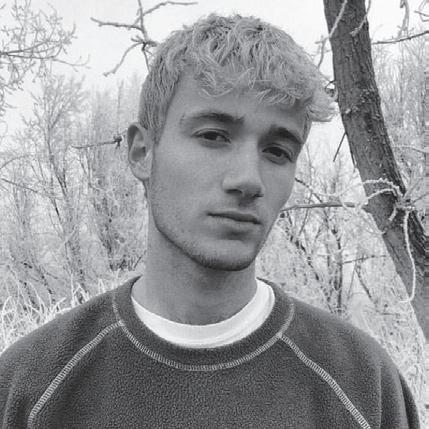


Physics major
Where do you live? Denver, CO
What is your title/company? Lead analytics consultant, United States Olympic and Paralympic Committee
Are there any particular skillsets you learned at CC that are useful to you now?
While I’m not directly applying physics principles or doing physics research, the problem-solving skills learned during my time in the physics department as well as the ability to model real-world observation through mathematical models are huge assets in my current job.
What was your first job out of college? My first position after CC was a direct result of a program at the college. I participated in the joint CC/USOPC externship program, which designates a handful of one-year fellowships at the USOPC to graduating CC seniors each year. I participated in the fellowship in the competitive analysis department, and have been lucky enough to continue at the USOPC ever since.
JESSIE POCOCK ’08

Sociology major
Where do you live? Colorado Springs, CO
What is your title/company? Executive director, Inside Out Youth Services, the LGBTQ+ youth community and outreach advocacy center



How is your major related to your current work?
I’ve always thought social justice work is social theory in action. Sociology prepared me to understand structural inequities. Working in the queer community has helped me understand how to challenge, dismantle, and work against inequities powered through community and grassroots activism. Plus, the block program taught me how to work really hard and really quick. Which is essential in the nonprofit community.
How did your experience at CC help you find your first position after graduation?
I hosted our first fundraiser at Cornerstone Arts Center, where we paired up our artists with community artists to create a wearable art show to express how it feels to be in community with a disability. We had over 300 attendees. I learned a lot. And made a lot of mistakes. After that point, I started getting involved in policy activism, civil rights, and LGBTQ+ activism. I have been involved in that work ever since.
MARCIA McNUTT ’74 Geophysicist and president of the National Science Foundation ELLAMARIA RAY ’85 Professor, anthropologist, and visual and performing artist MICHAEL NAVA ’76 Attorney and mystery writer JEREMY ZUCKER ’18 Singer, songwriter, and recording artist PEGGY FLEMING ’70 Gold medal Olympic figure skaterMajors & Minors Our College
Anthropology Art
Asian Studies
Business, Economics, and Society (BESoc)
Chemistry & Biochemistry Classics
Classics-English Classics-History-Politics Comparative Literature Computer Science Education English Environmental Studies Feminist & Gender Studies Film & Media Studies French Geology German History History-Philosophy
History-Political Science Independently Designed Major/IDM International Political Economy Italian Mathematical Economics Mathematics Molecular Biology Music Neuroscience Organismal Biology & Ecology Philosophy Physics Political Science Psychology Race, Ethnicity, & Migration Studies Religion Russian & Eurasian Studies Sociology
Southwest Studies Spanish & Portuguese Theatre & Dance
In addition, there are 29 thematic minors, which focus on themes from several disciplines. These range from Indigenous Studies to Journalism to Performance Design.
Accreditation & Non-Discrimination
• Founded in 1874
• Colors: Black and Gold
• Mascot: Tiger
• Total undergraduates: 2,200
• 48 U.S. states represented

• Number of faculty: 205
• Percentage of students living on campus: 80%
• Athletics: 16 varsity sports, 15 club, and 16 intramural
• Computer labs/ITS: Five, plus residence hall, departmental, and satellite labs across campus.
• Study Abroad: More than 70% of CC students study abroad at least once during their four years here.
• Campus residences: Traditional residence halls, small houses, themed housing, apartments, and cottages.
• Dining options: Rastall Café, Benjamin’s, The Preserve, Local Goods, Colorado Coffee, Susie B’s Café, and Taste Restaurant at the Fine Arts Center.
Smoking Policy
CC is a smoke- and tobacco-free campus.
Accessibility
Our Office of Accessibility Resources celebrates access, equity, and inclusion across our community. Every student — with every ability — is welcomed and assisted here at Colorado College.
Colorado College is accredited by the Higher Learning Commission. Colorado College is an equal opportunity employer committed to increasing the diversity of its community. We do not discriminate on the basis of race, creed, color, caste, national origin, gender, age, religion, gender identity or expression, disability, or sexual orientation in our educational programs and activities or our employment practices.
Take the next step
Visit
Schedule a visit with us at: coloradocollege.edu/visit Visit us virtually at: coloradocollege.edu/#virtualtour
Build Your Block Plan
See how the Block Plan works by building a mock schedule for your first year. Visit: coloradocollege.edu/yourblockplan
Apply
Join us! To start your application, go to: coloradocollege.edu/apply
Financial Aid
We offer a strong financial aid program that enables students from all socioeconomic backgrounds to attend and thrive at Colorado College. For additional info, please visit: coloradocollege.edu/financialaid
Tuition & Fees
Find tuition and fees at: coloradocollege.edu/tuition
Social Media
facebook.com/coloradocollege @coloradocollege @coloradocollegeadmission and @coloradocollege
Contact information
Get in touch, we want to hear from you! Meet your rep: coloradocollege.edu/meetyourrep Office of Admission: (719) 389-6344 Toll-Free: (800) 542-7214
Mailing Address: 14 E. Cache La Poudre St. Colorado Springs, CO, 80903
The


 Baca Campus lies 160 miles south of the main campus, just a short drive from the Great Sand Dunes National Park. The campus is made up of lodges, townhomes, a conference center, and nature trails. The Baca Campus is a great place to focus on your studies, whether that’s writing poetry, charting the stars, or diving into the cultures and religions of the Southwest.
A campus near the Rocky Mountains wouldn’t be complete without its own cabin! The Gilmore Stabler Cabin is 27 miles away from the main campus and classes also use the cabin to focus, including in language courses where students can only speak a foreign language the entire time they are there. The cabin is also a great retreat for Outdoor Ed courses, student organization meetings, or if you just want to grab some friends and head out to the wilderness for the weekend.
Baca Campus lies 160 miles south of the main campus, just a short drive from the Great Sand Dunes National Park. The campus is made up of lodges, townhomes, a conference center, and nature trails. The Baca Campus is a great place to focus on your studies, whether that’s writing poetry, charting the stars, or diving into the cultures and religions of the Southwest.
A campus near the Rocky Mountains wouldn’t be complete without its own cabin! The Gilmore Stabler Cabin is 27 miles away from the main campus and classes also use the cabin to focus, including in language courses where students can only speak a foreign language the entire time they are there. The cabin is also a great retreat for Outdoor Ed courses, student organization meetings, or if you just want to grab some friends and head out to the wilderness for the weekend.

